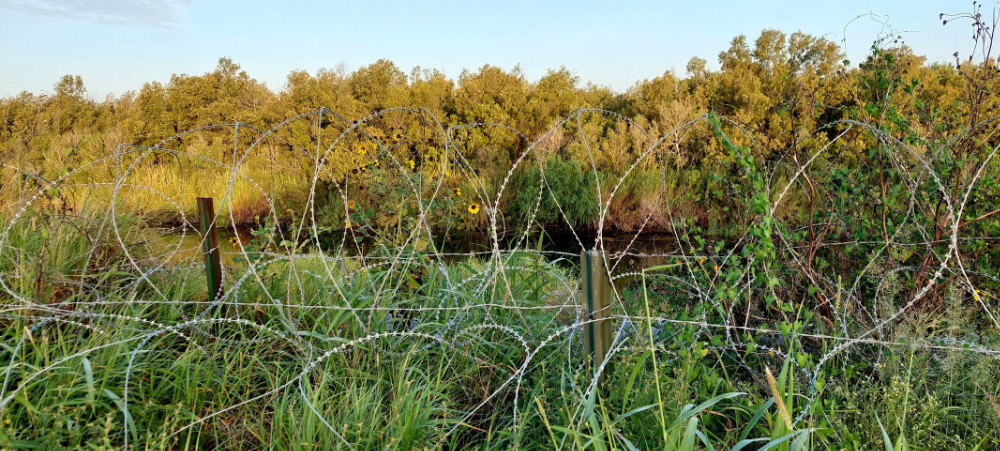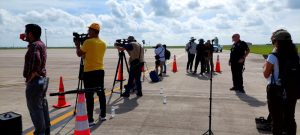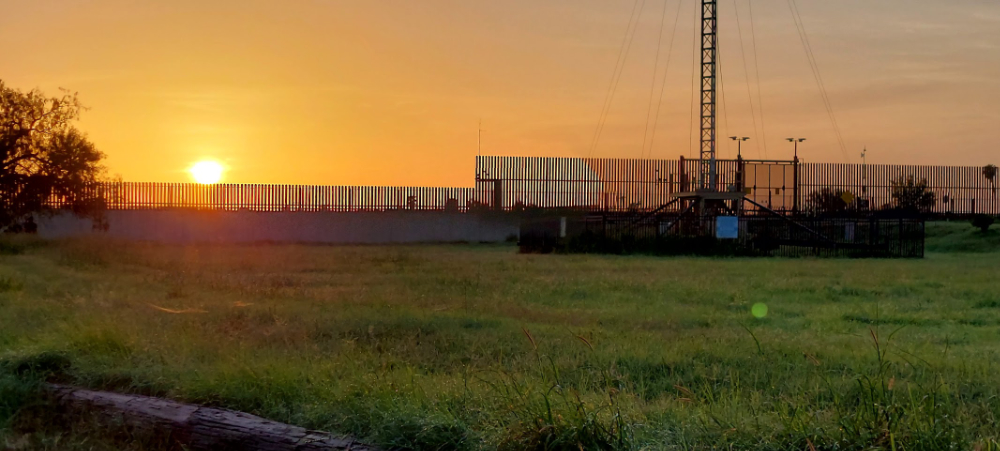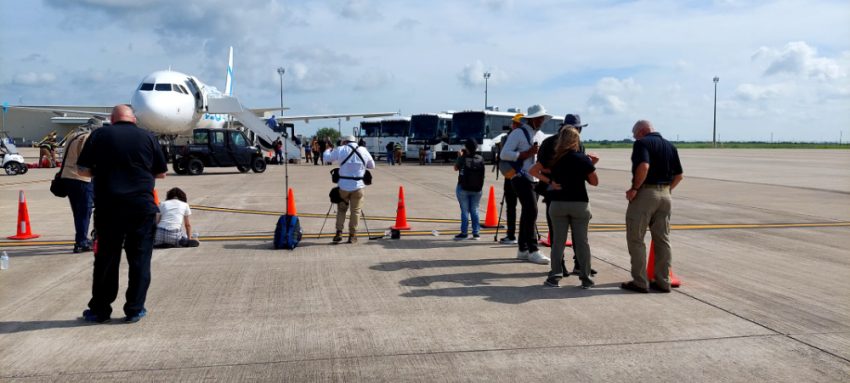Como detalle realista y mágico, tres mariposas amarillas volaban sobre una pista del aeropuerto de Harlingen la mañana del 18 de julio mientras de varios autobuses bajaban 133 colombianos que iban de regreso a su país: repatriados.
Fui testigo del abordaje como parte de mi trabajo. He tenido la fortuna de colaborar con la organización de periodismo sin fines de lucro InquireFirst en un programa que trae periodistas de Latinoamerica a cubrir el cambiante y complejo fenómeno migratorio en la frontera sur de los Estados Unidos.
Del 15 al 19 de julio pude acompañar a periodistas de Argentina, Cuba, México, Panamá y Perú en visitas a El Paso y a McAllen; en las dos ciudades, los reporteros pudieron entrevistar a oficiales de la Patrulla Fronteriza, autoridades gubernamentales que lidian con los migrantes que llegana la ciudad y organizaciones no gubernamentales que los apoyan y les brindan servicios. El trabajo periodístico es intenso. Las jornadas son largas, pero las historias que resultan son extraordinarias.
Yo ayudo en la logística, orientación y acompañamiento del grupo. No obstante, el instinto periodístico siempre está presente en mí y se enriquece en las pláticas con los colegas y en el observar cómo trabajan los reporteros, camarógrafos o videógrafos de otros países. Es fascinante y más.
Ese jueves 18, al ver las mariposas y a los migrantes bajar del autobús, con esposas, grilletes y cadenas atadas a los pies, una ráfaga de tristeza me invadió. En los dos viajes anteriores de este año y en este, se ha entrevistado a muchos migrantes. He aprendido mucho más de lo que sabía sobre migración, las leyes y los retos tanto de los migrantes como de las autoridades a cargo de controlar la situación. Estar en el campo siempre genera y enriquece otra perspectiva.
No obstante uno, periodista o no, no deja de sentir. Esa mañana, primero bajaron de los autobuses los hombres, luego las mujeres. Son personas con muy variadas historias. Las autoridades no dan detalles de los repatriados, solo que algunos habían sido detenidos recientemente, otros tenían semanas o meses en centros de detención, otros más pudieran haber estado por años viviendo en el país, pero su caso de asilo fue negado o en alguna infracción menor salió a la luz que no están autorizados para estar en el país. Como sea, regresan con los sueños rotos y una bolsa de ropa.
Quienes han migrado recientemente pueden haber viajado fácilmente en avión a la frontera norte de México, pero hay otros que han vendido todo lo que tienen ellos y su familia para pagar a un traficante, hay quienes han recorrido un camino infernal para llegar a la frontera cruzando el Darién y sobreviviendo en la garras de los carteles la travesía por México. Hay migrantes que cuentan historias terroríficas de violencia y abuso, y que ya dan muestras de estrés postraumático al hablar de ello. Eso también lo llevan de regreso.
El periodista tiene que mantener la imparcialidad y equilibrio. Por eso en este programa se les proporciona a los reporteros acceso a diferentes fuentes tanto oficiales como independientes. Yo en este caso me quedo al margen. Yo no tengo que reportar sobre lo que vemos, pero el impacto de lo que se vive llega al corazón de todos los participantes. Aun así, los periodistas ponen en pausa sus sentimientos y cumplen con su trabajo. Yo por mi parte, vi esas mariposas amarillas y pensé en Macondo y en el posible paraíso que en mi imaginación es Colombia, pero esta gente regresaba a una realidad que no es así. Tendrán que recalibrar sus esfuerzos, rediseñar sus proyectos de vida y superar esto.
En este viaje tuvimos que salir de la pista antes de que los repatriados dejaran de abordar. En otros viajes hemos visto también a familias con niños, los menores al menos no van esposados.
Conforme los veía yo subir, en silencio les deseaba lo mejor en su destino. Son momentos difíciles en la historia, la migración está cambiando y es probable que en todo el mundo no pare por algún tiempo. Encontrar la solución al fenómeno es muy complejo, entre más aprendo más me asombran los retos, en este país y en los países de origen de los migrantes.
La esperanza radica en ver que de algunos países la gente no migra. No quieren salir de sus países panameños, argentinos, costarrisenses o chilenos, por dar algunos ejemplos latinoamericanos. ¿Cuál es la razón? Dejo que los sociólogos den la respuesta, yo no sé lo suficiente para opinar, solo observo.
Por ahora, espero poder seguir colaborando en este programa de Inquire First y agradezco las experiencias que he vivido acompañando a los colegas. Estoy agradecida también por esas mariposas amarillas que llegaron a despedir a los colombianos. Su presencia, su colorido, la magia y poesía que representan enmedio de lo triste de las circunstancias me devolvió además el deseo de volver a escribir. Llevaba yo meses de silencio. De aquí en más, no suelto el teclado.
“Mariposas amarillas, Mauricio Babilonia, mariposas amarillas que vuelan liberadas…”

Yellow butterflies bid farewell to repatriated Colombians, creating magic in a tragic moment
In a poignant and serendipitous moment, three yellow butterflies graced the skies over Harlingen airport on the morning of July 18, as 133 Colombians were being unloaded from several buses on their way home. They were being repatriated.
I was present for the boarding process as part of my professional responsibilities. I have been fortunate to collaborate with the non-profit journalism organization InquireFirst in a program that brings journalists from Latin America to cover the evolving and complex migration phenomenon on the southern border of the United States.
From July 15-19, I had the privilege of accompanying journalists from Argentina, Cuba, Mexico, Panama, and Peru on visits to El Paso and McAllen. In both cities, reporters were able to engage in dialogue with Border Patrol officials, government authorities who deal with migrants arriving in the city, and non-governmental organizations that support and provide services to them. The journalistic work of this program is challenging and demanding. The days are long, but the stories that result are truly remarkable.
I assist with logistics, orientation, and accompanying the group. However, my journalistic instinct is always present and enriched by conversations with colleagues and observing how reporters, cameramen, and videographers from other countries work. It is fascinating and more.
That Thursday, the 18th, seeing the butterflies and the migrants getting off the bus, with handcuffs, shackles, and chains tied to their feet, a wave of sadness washed over me. In the two previous trips this year and this one, many migrants have been interviewed. I have learned much more than I knew about migration, the laws, and the challenges faced by both the migrants and the authorities in charge of managing the situation. Being in the field always generates and enriches another perspective.
Nonetheless, one, journalist or not, cannot stop feeling. That morning, first, the men got off the buses, then the women. These are people with very varied stories. The authorities do not provide details of the repatriates, only that some had been recently detained, others had been in detention centers for weeks or months, and still others might have lived in the country for years but had their asylum case denied or were discovered to be unauthorized to stay in the country due to a minor infraction. In any case, they return with broken dreams and a bag of clothes.
Those who have recently arrived may have simply flown to the northern border of Mexico, but there are others who have sold everything they and their families have to pay a smuggler, there are those who have traveled a hellish road to reach the border, crossing the Darien and surviving in the grips of the cartels to make the journey through Mexico. There are migrants who tell horrific stories of violence and abuse and who show signs of post-traumatic stress as they speak. They as well take that with them when they go back home.

Journalists need to be impartial and balanced. That’s why in this program reporters are given access to different sources, both official and independent. In this case, I stay on the sidelines. I don’t have to report what we see, but the impact of what we experience touches everyone’s heart. Still, journalists put their feelings aside and do their jobs. I, for one, saw those yellow butterflies and thought of Macondo and the possible paradise that is Colombia in my imagination, but these people are returning to a reality that is not so. They are going to have to recalibrate their efforts, redesign their life projects, and overcome this.
On this trip, we had to leave the runway before the repatriates finished boarding. On other trips, we have also seen families with children, at least the minors are not handcuffed.
As I watched them board, I silently wished them well at their destination. These are difficult times in history, migration is changing and it is likely that it will not stop worldwide for some time. The solution to this phenomenon is very complex, and the more I learn, the more I am amazed by the challenges, both in this country and in the migrants’ countries of origin.
The hope lies in the fact that from some countries people do not migrate. Panamanians, Argentines, Costa Ricans or Chileans, to name a few Latin American examples, do not want to leave their countries. What is the reason for this? I leave the answer to the sociologists, I do not know enough to give an opinion, I only observe.
For now, I hope to continue working in this Inquire First program and I am grateful for the experiences I have had accompanying colleagues. I am also grateful for the yellow butterflies that came to say goodbye to the Colombians. Their presence, their color, the magic and poetry they represent in the midst of the sadness of the circumstances also gave me the desire to write again. I had been silent for months. From now on, I will not let go of the keyboard.
“Mariposas amarillas, Mauricio Babilonia, mariposas amarillas que vuelan liberadas…”

Keep this site alive. Donate $1 or more. Ayuda a mantener activo este sitio. Dona desde $1. Gracias.




